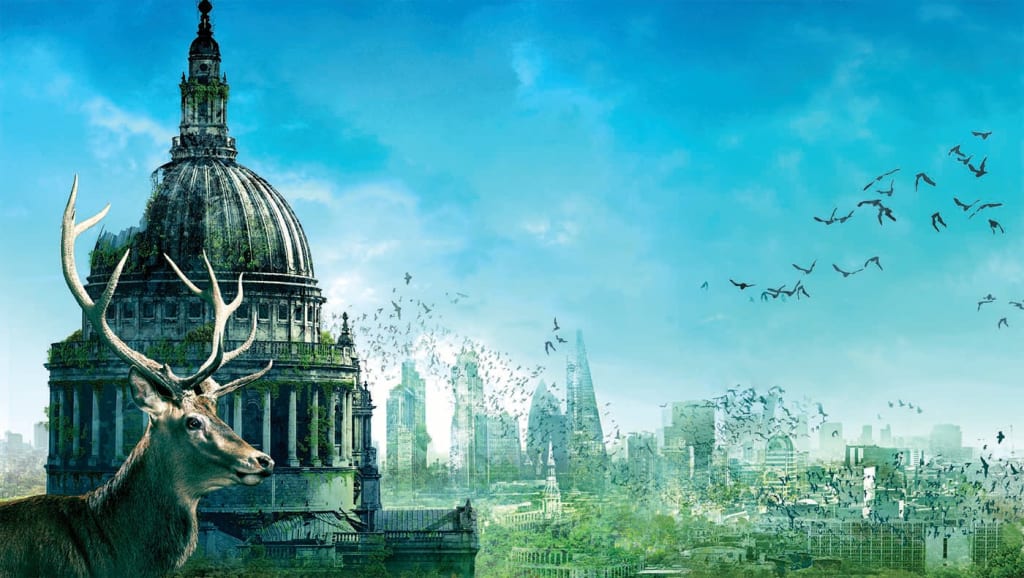A World Without Humans:
Animals Take Over as the Top Species

Imagine a world where humans have gone extinct, and animals have evolved to become the new top species. It's a tricky thought experiment since humans possess high intelligence, fashion sense, cooking skills, and smartphones, among other things. However, with the continuing changes in the planet's climate, many species will need to adapt to survive. With modern gene sequencing technology and our understanding of evolution, scientists have some ideas about which animals could develop skills like humans and build complex societies.
Convergence, where two unrelated organisms develop similar traits to succeed in a particular environment or fill a niche, will also play a big role in the animal kingdom's future. For example, fish have torpedo-like bodies and fins that make them perfectly suited for water. However, dolphins have evolved similar bodies, even though they are warm-blooded air-breathing mammals with a different evolutionary background. It's possible that some animals could develop hands similar to ours to fill the same role as humans, like building cities and modifying the environment. Primates like chimpanzees and bonobos are already close to that with their opposable thumbs, which they use to make tools in the wild.
Birds, the only surviving dinosaurs, could also become the new smartest animals if humans suddenly disappear. Birds are incredibly brainy and can flock together in large groups, with some even building communal nesting sites like the sociable weaver. However, they may not build cities that look like human metropolises. Octopuses are the smartest non-human animals on Earth, capable of distinguishing between real and virtual objects and engineering their environment. However, adapting to life on land might be tricky for them.
There's a lot that we don't know about animal intelligence, and humans have been quite arrogant about it throughout history. In the past, people used to think that animal intelligence could be neatly organized into a hierarchy, with humans at the top and insects at the bottom. However, in the 1960s, a new generation of researchers challenged this idea and suggested that intelligence should be measured in relative rather than absolute terms. As technology has improved, we've been able to see animals for longer without disturbing them, and we've discovered that they are far more intelligent than we once thought.
For example, researchers in Melbourne are using remote-controlled drones to study the breeding patterns of Southern right whales, and artificial intelligence is helping us track and predict the movements of all sorts of creatures. Dolphins use names and even have accents, with researchers finding that dolphins in southern Brazil developed a distinct accent after interacting with local fishers for over a hundred years. Birds and insects are also pretty smart, with parrots having complex social groups and being able to differentiate between members of their species based on their relationships with each other. Insects are capable of some pretty impressive cognitive feats like tool use and learning by observation, despite having tiny brains.
Intelligence is distributed in different ways across the animal kingdom. Some animals excel in one area but may not be as good in another. It's all about the environmental pressures that each species faces and how they adapt to them. The usual suspects when it comes to high intelligence in the animal kingdom are chimps, dogs, and dolphins. However, there are some unexpected additions to the list that might surprise you. One of these is our feline friends – house cats. They're renowned masters of getting treats and avoiding baths, but did you know that they're also pretty smart? Cats have an amazing ability to learn from observation and repetition, which is why we've coined the term "copycats." Some cats, like the one named Nora in a story, take it to the next level. Nora's owner spends her days teaching kids to play the piano, and this cat was getting a little jealous of all the attention they were.
Similarly, some insects like bees and ants are known for their advanced social structures and communication abilities. They can work together to build complex nests and hives, and even communicate with each other through a series of chemical signals. And let's not forget about the amazing feats of navigation displayed by migratory birds, who can travel thousands of miles without getting lost.
Of course, the idea of any animal developing the same level of intelligence and complex societies as humans is still largely speculative. Our evolution and development as a species was unique and complex, and it would be difficult for any other animal to replicate it exactly. However, as our understanding of animal intelligence and evolution continues to grow, we may be surprised by the abilities of other species.
In the end, the possibility of another animal species becoming the dominant species on Earth after humans is a fascinating and thought-provoking idea. It's a reminder that the Earth will continue to evolve and change long after we're gone, and that there is still so much we have yet to learn about the world around us.
About the Creator
Robby Rahadi Putra
Apart from my professional work as auditor, I am also an avid writer and reader. I enjoys writing novels and other creative content in my free time, as well as delving into books to expand my knowledge and understanding of the world.






Comments
There are no comments for this story
Be the first to respond and start the conversation.